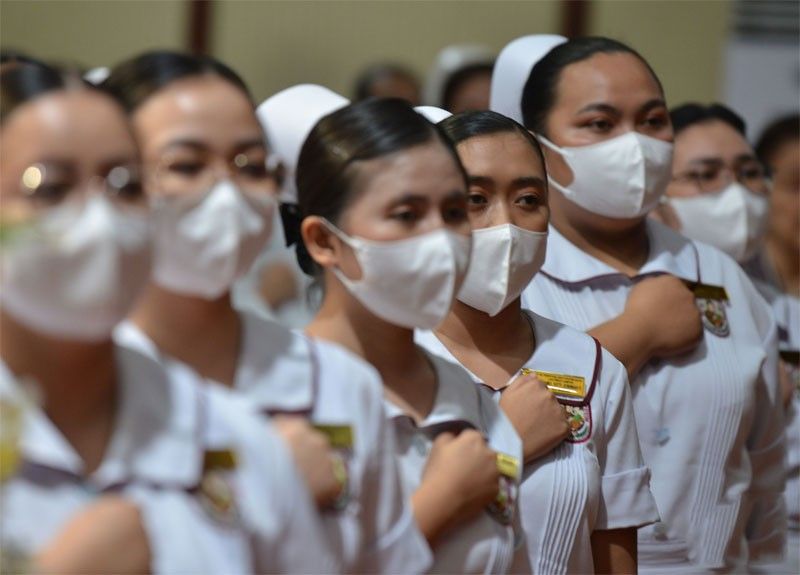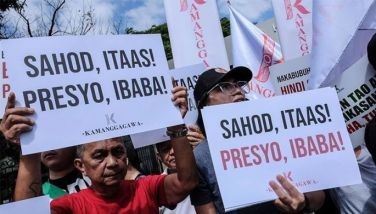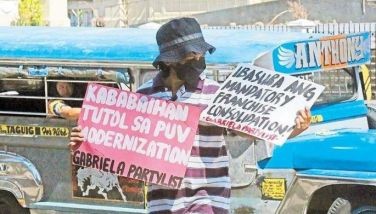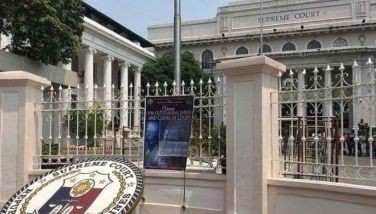Marcos on nurse exodus: We’re victims of our success

MANILA, Philippines — The Philippines has become a “victim” of its own success as world leaders have asked for help to send more Filipino health workers abroad, resulting in a “shortage” of personnel, President Marcos admitted yesterday.
Marcos made the remark during a meeting with members of the Business Executives for National Security (BENS) in Malacañang, which tackled US investments in the Philippines’ health, digital infrastructure and energy programs.
“Unfortunately, in terms of health care workers, we have become victims of our own success in that the Filipinos did really well during the pandemic. And so every leader I meet says ‘can we have more Filipino med techs, doctors and nurses?’ So we’re having a shortage here,” Marcos said.
“So we are trying to find schemes so as to alleviate that problem. One of the things our Department of Health (DOH) has come up with is that we are coming to an arrangement with countries who will accept Filipino health care workers to at the same time train the equivalent number of health care workers that will stay in the Philippines,” he added.
According to Marcos, the government is also trying to accelerate the board examinations to produce more nurses.
“So that’s the adjustment that we are trying to make. It’s not only in the facilities, it’s also in the training. We are very proud of them but we wish they’d stay home,” the Chief Executive said.
Late last year, the DOH said the Philippines lacks about 194,000 health personnel as it reiterated the need to upgrade the salaries of workers in the sector. The country was short of more than 106,000 nurses and 67,000 physicians, the agency added.
Last month, Health Secretary Ted Herbosa announced a plan to hire nursing graduates whose scores are slightly lower than the 75 percent passing grade in government hospitals. He clarified that only those whose scores are 70 to 74 percent would be tapped to work in state-run hospitals.
At the same meeting, Marcos talked about the government’s initiatives in the health sector, including the groundbreaking of a multi-specialty hospital outside Manila and the plan to build more hospitals in far-flung areas.
“I’m always been a great believer of bringing health care down to the grassroots level. Right now, there is a tendency for us to only go to the hospital when it is absolutely necessary ... So health care has become an important part of this administration’s efforts,” he added.
Energy, digitalization
Marcos also talked about issues surrounding the energy sector, noting that the price, reliability and supply of energy are among the problems being raised by foreign investors in the country. He assured the members of BENS that the government is addressing the concern.
“The ease of doing business is something that we can do immediately... because putting up power plants, no matter what kind of power plants, there are six, seven years, lead time. So maybe with the new technologies maybe we can do better,” the President said.
“So that we are certainly working on. The distribution has improved. The distribution is a factor because there are parts of the Philippines where they have ... then there are certain areas where they do not, deficit. So that’s what we are hoping to attend to in the near term,” he added.
Marcos also cited the amendments to some laws that seek to make the Philippines more attractive to investors, especially on the digitalization of the country’s economy. He also enumerated measures aimed at assisting micro, small and medium enterprises, the sector that accounts for the bulk of employment in the Philippines.
“We are trying to bring them into the system of digital marketing. So we put up an app for small businesses,” he said.
“We have encouraged all of these private NGOs (non-government organizations) who have had an interest in promoting startups. We are trying to create an environment that will be friendly to startups because we know that startups have a higher rate of failure than other traditional businesses. So we need to be able to adjust to that new way of doing things.”
Also mentioned during the meeting was the business process outsourcing industry, which continued operating even during the COVID-19 pandemic through the work-from-home setup.
“It derives from the very clear understanding that many of the challenges that we face today, the solutions lie in new technologies. And that’s why the retraining and re-skilling of our people have become important because we have to get them into that line of work so that we have enough people to occupy that,” Marcos said.
“Actually, the workforce is quite full when it comes to tech. But again, we need to catch up in terms of training, in terms of getting involved in the new technologies that we are seeing for many reasons: for digitalization, for climate change, for cybersecurity,” he said.
In a statement, the Presidential Communications Office said BENS members reaffirmed their commitment to boost the cooperation and investment of the US in the health, digital infrastructure and energy programs in the Philippines.
Founded in 1982, BENS is a ten-member business group in the US. Its members are in the Philippines until July 13 to discuss business and national security issues with Philippine leaders and explore potential areas for investment and cooperation.
Nurses in Vienna
Meanwhile, the Philippine embassy in Austria and the city of Vienna signed a new agreement to bring Filipino nurses to Vienna under a framework that protects their rights and eases professional and social integration.
The agreement comes exactly 50 years after the signing of a similar agreement between Manila and Vienna in 1973. This agreement facilitated the “first wave” of approximately 600 Filipino health care professionals, who worked in 14 different hospitals in the Austrian capital in the 1970s.
Philippine Ambassador to Austria Evangelina Lourdes Arroyo-Bernas signed on behalf of the Philippines the Memorandum of Understanding (MOU) on the recruitment of Filipino nurses between the Philippines and the Federal State of Vienna and the Austrian Federal Economic Chamber.
Department of Migrant Workers Undersecretary Patricia Yvonne Caunan was a signatory witness to the agreement, which is seen as the culmination of sustained bilateral labor talks between the two countries, and a revival of the longstanding cooperation in the field of health care.
The MOU outlines an ethical, transparent and sustainable recruitment framework that will govern the entry, hiring and integration of Filipino health care professionals in Vienna.
- Latest
- Trending


































